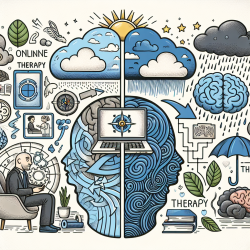As practitioners dedicated to improving the lives of children, it is crucial to stay informed about the latest evidence-based interventions. One such intervention is the COMPASS programme, a therapist-supported digital cognitive-behavioral therapy (CBT) designed to manage depression and anxiety in individuals with long-term physical health conditions (LTCs). This blog post will delve into the key findings of a recent study titled "A cognitive–behavioural therapy programme for managing depression and anxiety in long-term physical health conditions: mixed-methods real-world evaluation of the COMPASS programme," and how these findings can be leveraged to enhance therapy outcomes.
Key Findings from the COMPASS Programme
The study employed a mixed-methods approach to evaluate the effectiveness and acceptability of the COMPASS programme in real-world settings. Here are the primary outcomes:
- Significant Reduction in Depression and Anxiety: Patients who participated in the COMPASS programme experienced a significant reduction in depression (Cohen's d = -0.376) and anxiety (Cohen's d = -0.420) scores.
- Improvement in Functional Impairment: Functional impairment scores also showed significant improvement (Cohen's d = -0.282).
- Enhanced Psychological Distress: There was a significant reduction in psychological distress (Cohen's d = -0.422).
Effect sizes were larger for patients with clinically significant baseline symptoms, suggesting that the programme is particularly beneficial for those with more severe initial conditions.
Qualitative Insights
The qualitative component of the study provided valuable insights into patient experiences. Two main themes emerged:
- Engagement: Patients appreciated the flexibility and accessibility of online therapy. However, some faced challenges due to low technological literacy or severe health conditions. The presence of a therapist was crucial for maintaining engagement and providing emotional support.
- Integration of Mental and Physical Health: Patients valued the LTC-tailored content, which helped them manage their symptoms better, improve their mood, and increase their resilience to LTC challenges.
Practical Applications for Practitioners
Based on these findings, here are some actionable steps for practitioners:
- Emphasize Therapist Support: Ensure that therapists are available to provide guidance and emotional support, as this significantly enhances patient engagement and outcomes.
- Tailor Content to LTCs: Incorporate content that addresses the specific challenges faced by individuals with LTCs. This can improve the relevance and effectiveness of the therapy.
- Address Technological Barriers: Provide technical support to patients who may struggle with the digital platform. Consider offering blended therapy options for those with severe symptoms.
Encouraging Further Research
While the COMPASS programme shows promising results, further research is essential to refine and optimize the intervention. Practitioners are encouraged to stay updated with ongoing studies and contribute to research efforts to continually improve therapy outcomes.
To read the original research paper, please follow this link: A cognitive–behavioural therapy programme for managing depression and anxiety in long-term physical health conditions: mixed-methods real-world evaluation of the COMPASS programme.










